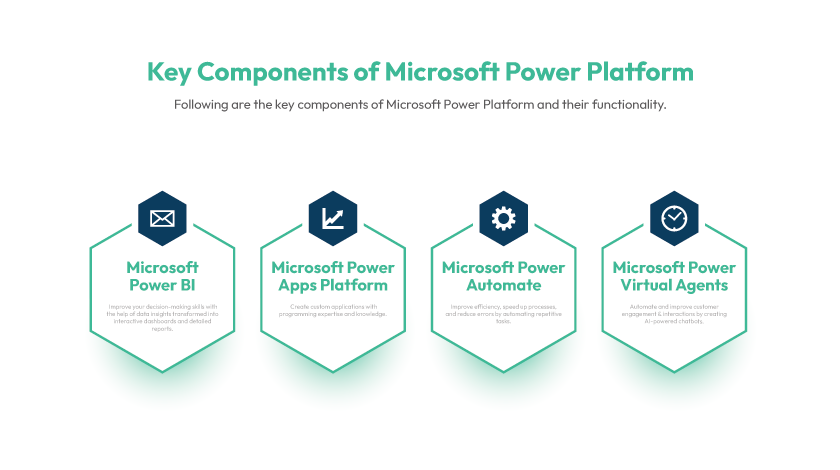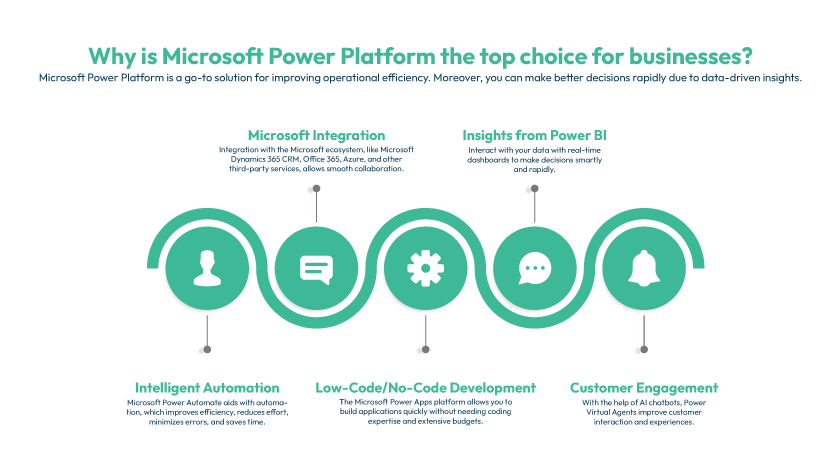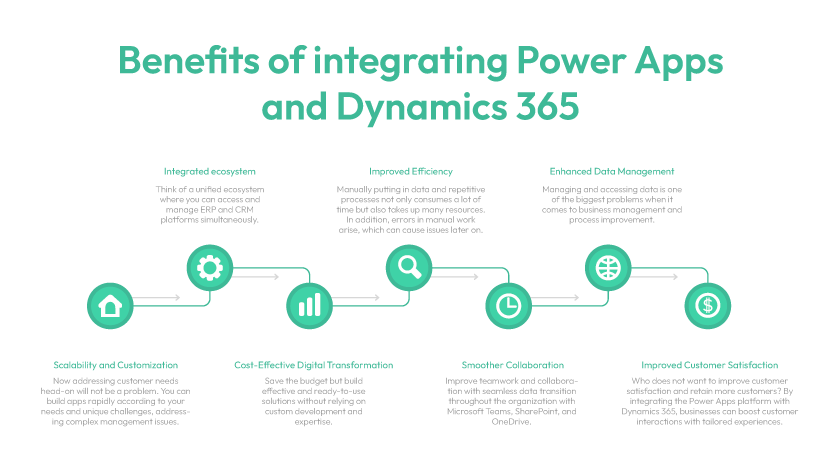A smooth and strong integration is important to utilize the benefits of the Microsoft Power Apps Platform and Microsoft Dynamics 365. Here at Dynamics Solutions, we dedicate certified developers and consultants with industry knowledge to create tailored solutions so you can get the most out of your investment. We offer all-in-one solutions to achieve seamless processes and better productivity.
By integrating Microsoft Power Apps with the Microsoft Dynamics 365 platform, you can upgrade your business further. The Microsoft Power Apps platform is designed to have smooth integration with other power platforms like Power BI and more. Their cohesiveness is unrivaled, and the benefits you can get are unlikely to be matched elsewhere.
Are you planning for a digital transformation? The Microsoft Power Platform is one of the best digital transformation solutions available. Providing tools and highly customizable dashboards for business process optimization, data analysis, and building apps without coding expertise. Let us have a look at how these two work together, reinforcing orchestration.
What is the Microsoft Power Apps platform?
The Microsoft Power Platform is a suite of low-code and no-code tools for automation, data analysis, and app building for business processes. It easily and seamlessly integrates with other Microsoft products, like Office 365 and Dynamics 365, as well as third-party services.
Whereas Microsoft PowerApps is a suite of multiple applications, services, and data platforms. It provides an environment for businesses to build custom apps quickly. You can then deploy the application and integrate it with other applications like SharePoint, Microsoft 365, Dynamics 365, SQL Server, and many more.
Key Components of Microsoft Power Platform
Following are the key components of Microsoft Power Platform and their functionality.
- Microsoft Power BI: Improve your decision-making skills with the help of data insights transformed into interactive dashboards and detailed reports.
- Microsoft Power Apps Platform: Create custom applications with programming expertise and knowledge.
- Microsoft Power Automate: Improve efficiency, speed up processes, and reduce errors by automating repetitive tasks.
- Microsoft Power Virtual Agents: Automate and improve customer engagement & interactions by creating AI-powered chatbots.

Now you can extend CRM and ERP functionalities, easily automate workflows, and get insights within the Microsoft ecosystem because of Power Platform Dynamics 365 connectivity.
Microsoft Dynamics 365: Quick Overview
Microsoft Dynamics 365 is business-focused software. It consists of multiple cloud-based applications for business management, for example: finance, operations, HR, and customer relations. Moreover, businesses can utilize it for sales, marketing, supply chain management, and much more.
What does Dynamics 365 do?
Microsoft Dynamics 365 combines functionalities and offers the convenience of complete business management and improvement under one platform. CRM, ERP, and supply chain are its core features.
- The customer relationship management module provides insights about customer and stakeholder interactions as well as manages them effectively.
- The enterprise resource planning module helps you streamline and plan finances, sales, and manufacturing lineups for optimal results without disturbance.
- With the supply chain management module, you can track and manage resources and workforce smartly for best utilization.
Why Choose Dynamics 365?
By integrating Microsoft Dynamics 365, your business can improve with the help of predictive insights, save time with automation, and offer tailored experiences to customers. Thus, you get ahead of the competition.
Why is Microsoft Power Platform the top choice for businesses?
Microsoft Power Platform is a go-to solution for improving operational efficiency. Moreover, you can make better decisions rapidly due to data-driven insights.
- Microsoft Integration
Integration with the Microsoft ecosystem, like Microsoft Dynamics 365 CRM, Office 365, Azure, and other third-party services, allows smooth collaboration.
- Low-Code/No-Code Development
The Microsoft Power Apps platform allows you to build applications quickly without needing coding expertise and extensive budgets.
- Intelligent Automation
Microsoft Power Automate aids with automation, which improves efficiency, reduces effort, minimizes errors, and saves time.
- Insights from Power BI
Interact with your data with real-time dashboards to make decisions smartly and rapidly.
- Customer Engagement
With the help of AI chatbots, Power Virtual Agents improve customer interaction and experiences.

With the help of Microsoft Power Platform and its smart tools, empower your business to lead the competitive digital world.
Why integrate Power Apps with Dynamics 365?
In this modern world, businesses need to find effective ways to bridge the gap between data and applications that use them. One such effective and scalable solution is Microsoft Power Apps and Dynamics 365 integration. Building low-code and no-code custom applications quickly according to the needs is one of the core benefits.
However, Dynamics 365 offers a bigger range of business applications that can be utilized for improving business operations. The integration of Power Apps and Dynamics 365 into any business can bring many benefits.
Microsoft Power Apps and Dynamics 365: A Powerful Combination
The Microsoft Dynamics 365 applications, like Dynamics 365 Sales, Dynamics 365 Customer Service, and more, work coherently with Power Apps to store and secure data and offer easy data access.
Because the two are integrated into your business, you can build applications quickly and never worry about integrating them into the system because they are already a part of it within Dynamics 365. So, the most useful and powerful feature of Microsoft’s Power Platform is its integration with Dynamics 365.
Benefits of integrating Power Apps and Dynamics 365
- Integrated ecosystem
Think of a unified ecosystem where you can access and manage ERP and CRM platforms simultaneously. Sync data from different departments for efficient data handling and utilization. - Improved Efficiency
Manually putting in data and repetitive processes not only consumes a lot of time but also takes up many resources. In addition, errors in manual work arise, which can cause issues later on. Through automation, you can not only eliminate manual work but also save time and resources and protect yourself from human errors. Using Power Apps and Dynamics 365, you can forget about repetitive tasks and streamline operations across the organization, boosting performance. - Enhanced Data Management
Managing and accessing data is one of the biggest problems when it comes to business management and process improvement. Moreover, due to the lack of central data, making decisions based on older data can reduce the effectiveness of the results. Thus, with the Dynamics 365 Microsoft Power Apps platform, businesses benefit from synced, centralized data. It not only improves data accuracy but also provides real-time analytics. - Scalability and Customization
Now addressing customer needs head-on will not be a problem. You can build apps rapidly according to your needs and unique challenges, addressing complex management issues. - Cost-Effective Digital Transformation
Save the budget but build effective and ready-to-use solutions without relying on custom development and expertise. - Smoother Collaboration
Improve teamwork and collaboration with seamless data transition throughout the organization with Microsoft Teams, SharePoint, and OneDrive. - Improved Customer Satisfaction
Who does not want to improve customer satisfaction and retain more customers? By integrating the Power Apps platform with Dynamics 365, businesses can boost customer interactions with tailored experiences. With real data provided and automation, you can provide quick and better customer service. Moreover, with Microsoft Power Automate and Power Apps, you can also create self-service portals and product recommendations to offer customers better experiences.

Power Platform Solutions for Dynamics 365
To solve unique challenges, you would need tailored solutions built for you, according to your needs. If you are looking for such solutions, then Dynamics Solutions is the right place to be. We not only offer end-to-end solutions but also offer certified Dynamics 365 consultants. Our approach to solving your problems and expertise in Dynamics 365 makes us the best choice.





